Pan African Studies 350
Advanced Writing
Spring Semester 2006-2007
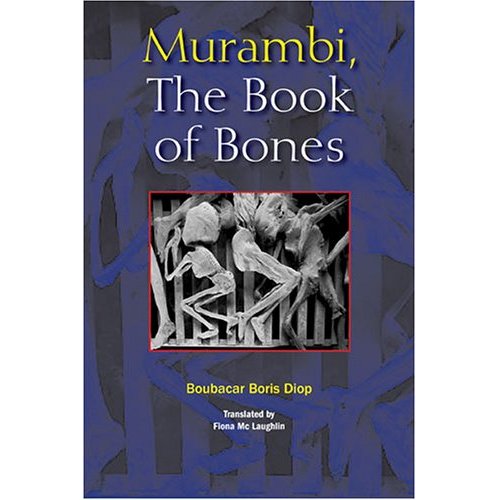
Ticket #13930
Instructor: Johnie H. Scott, M.A., M.F.A.
Units: 3
Associate Professor
MWF, 11:00am-12:00pm PAS Writing Program Director
Sierra South 310
Santa Susanna Bldg., Room 210
Email Office Hours: MWF, 12:30pm-2:00pm or
Webpage By Appointment
Telephone: 818-677-2289
Course Description:
Prerequisite
– completion of the lower-division writing requirement. Advanced course emphasizing alternative strategies in expository
writing skills development. Focuses on such purposeful
forms of discourse as reports, the research paper, critiques, the essay
examination, and selected forms of correspondence. Cursory review of
grammar, mechanics and syntax is offered as needed. More intensive review of
such basics is available on an individualized basis in the
Required Textbooks:
1. Dawe,
Charles W. and Edward A. Dornan, One to One:
Resources for Conference-Centered Writing/Fifth Edition, Longman Classics
in Composition, Pearson Longman,
2. Diop,
Boubacar Boris, Murambi,
The Book of Bones, Translated by Fiona McLaughlin, Indiana University
Press, Bloomington, Indiana, © 2006;
3. Greer, Michael, What
Every Student Should Know About Citing Sources with MLA Documentation,
Pearson Longman, New York, NY: © 2007 by Pearson Education; and
4. Scott, Johnie H., editor, The
Effective Writer, Pearson Custom Publishing,
Recommended:
5. Dyson, Michael Eric, Come
Hell or High Water: Hurricane Katrina and the Color of Disaster, Basic Civitas Books,
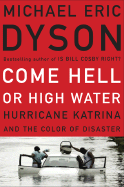
6. Glasrud, Bruce A. and
Laurie Champion, eds., The African-American
West: A Century of Short Stories, University Press of
6. Trimble, John R., Writing
with Style: Conversations on the Art of Writing/Second Edition, Silver
Anniversary Edition, Prentice Hall Publishers, Upper Saddle River, New
Jersey, © 2000.
Course Objectives:
The PAS 350 Advanced
Writing student meets ten (10) primary objectives in taking this course. Those
objectives are:
ü The course will increase the student’s ability to
analyze and comprehend university-level texts;
ü The course will expand and enhance, through culturally
diverse readings, the awareness of rhetorical strategies as well as the abuses
and uses of language;
ü The course will increase the critical reasoning skills
as they reflect the interdependence of critical thinking and written discourse;
ü The course will build confidence, reduce writing
anxiety, and strengthen personal voice;
ü The course will reinforce the theory and practice of
writing as a recursive process;
ü The course will help students understand the many
contexts for writing, including timed writing, and develop appropriate
strategies for the writer’s multiple purposes and audiences;
ü The course will develop fluency and style by
encouraging word and sentence variety, increasing vocabulary, and using Edited
American English;
ü The course will increase proficiency in research
techniques required by various University disciplines and familiarizes students
with appropriate style sheets;
ü The course will definitely facilitate the use of basic
computer applications – word processing, email, and Internet access – and other
technological media including HyperNews and PowerPoint; and
ü The course will promote writing as a means of
participation in democracy and as a tool for social change.
Student Learning Outcomes for PAS 350:
The
PAS 350 Advanced Writing student will realize 18 outcomes as a direct
result of meeting the stated objectives for this course. Those outcomes include
the following:
ü A developed facility at examining explicit
relationships that exist between general concepts and specific details;
ü An enhanced understanding of the relationships among
sentence structures, word choice, and meaning;
ü The ability to read critically about ideas and issues,
including multicultural perspectives; analyze and synthesize information; draw
inferences from data; draw conclusions from arguments; and distinguish fact
from fiction;
ü The ability to analyze message, audience, language
choice, tone, purpose, and author’s ethos in selections from a text;
ü The ability to comprehend and critically assess
writings that reflect multicultural images and perspectives;
ü The ability to recognize logical fallacies, biased
language, idioms, slang, jargon, and tone;
ü The ability to develop ideas with logical support,
including the use of informed opinion, facts, and their interpretations;
ü The ability to write critically about ideas, including
multicultural perspectives; analyze and synthesize information; draw inferences
from data; draw conclusions from arguments; and distinguish facts from opinion;
ü The ability to write both independently and in
collaboration with others;
ü The ability to assess and address appropriately the
character and needs of an explicit audience;
ü A facility in using different genres in writing (e.g.,
autobiography, position, problem-solution, argumentative and case studies) for
different academic disciplines or discourse communities;
ü The ability to apply the concepts of
subordination/coordination; abstract/concrete words; general/specific examples;
and cohesion;
ü Development of vocabulary appropriate to the subject
and/or topic;
ü The ability to effectively use the syntactic and
mechanical conventions of Edited American English (.g., grammar, usage,
mechanics, and diction);
ü The ability to integrate one’s own ideas with those of
others, using appropriate documentation;
ü The ability to use a style sheet consistently, such as
MLA or APA style sheets;
ü An awareness and appreciation of diverse cultures and
contexts of human experience;
ü The ability to show ways that writing can contribute
to society and be an instrument for change; and
ü Lastly, the student will be able to demonstrate the
ability to write for possible publication.
Student Information Competence (IC) Outcomes for PAS
350:
The
PAS 350 Advanced Writing student may expect to experience four specific
outcomes as a direct result of meeting the stated objectives for this
course. Those outcomes include the following:
ü The ability to effectively use library and online
resources individually and in concert with others;
ü Knowledge and mastery of basic word processing, email,
WebCT, PowerPoint and the Internet;
ü The ability to integrate one’s own ideas with those of
others, using appropriate documentation with the varied formats of information
technology; and finally,
ü The ability to use computer technology in the writing
process, including research and documentation.
How Met (Assessment):
- Pre-Semester, Midterm and Common Timed Essay
Examinations;
- Objective Quizzes, Midterm Objective Examination
and Exit Essay Examination on grammar and mechanics of writing;
- Formal Homework Assignments submitted via
electronic mail (i.e., Information Technology);
- Advanced Writing Group Presentations using Power
Point to discuss Grammar and
Mechanics of Writing (e.g., The Structure of Sentences) , formats for
documenting research (e.g., Modern Language Assn.) with these Group
Presentations providing another method for assessing information
technology skills;
- Four expository papers involving various
modes of written communication including personal narrative, evaluative,
position and problem-solution essays;
- The Write Time Discussion Forums afford
for students to become orientated to the WebCT and HyperNews at same time
they are learning additional Information Technology skills through an
ongoing learning process.
Course Requirements:
- Essay Examinations: One of the objectives in this course is for the
student to achieve a mastery of the timed essay examination. To this end,
there are four (4) timed essay examinations in this course. Those
examinations are all taken by the student using a large (i.e., 8 ½”x11”)
Blue Book. Each examination is timed at 60 minutes, i.e., the same amount
of time as the Upper Division Writing Proficiency Examination (UDWPE)
required of every CSUN student prior to actual graduation. The essay
examinations in this class include the Pre-Semester, Midterm,
12-Week and Common Essay. The Pre-Semester Examination does
not count towards the final course grade. The remaining three essay exams,
on the other hand, are averaged together and count as one of the primary
grade factors for the class. These essay examinations are scored using the
same rubric as the UDWPE. It is expected that each student will show
improvement in matriculating through the course, as each essay examination
is progressively more challenging in demands on writing skills. The
Pre-Semester and Common Essay serve as one of the assessments for this
course.
- Objective Examinations: Students in this class are assessed in regards
to the skills taught and/or reviewed in regards to college study skills,
grammar and mechanics, and the various writing conventions. The
assessments of those skills taught in the class take the form of objective
quizzes, a two-part Midterm Objective Examination and an Exit
Examination. These objective examinations are averaged together in
forming the second of the primary grading factors in the class.
- Critical Comprehension Homework Assignments: There are formal homework assignments in this
class which are based upon improving and increasing the student’s critical
thinking and reading comprehension skills. These assignments are all to be
submitted using email and are averaged together in constituting the third
primary grading factor for the course. It is to be noted the homework
assignments are all due as noted by the course instructor, and that no
“late” homework assignments will be accepted for grading. Accordingly,
an assignment due at 10:00am and not submitted for grading until 11:00am,
i.e., one hour later, will be judged as “failing” in that the student
failed to meet the submission deadline. It is to be understood that
developing a work ethic in which students successfully meet deadlines is
part of the assignment, and the course itself.
- The Write Time Discussion Forums: Located within WebCT, the Write Time
Discussion Forums provide students with opportunity to develop and enhance
information competence skills by using the very latest in distance
learning technology. The Write Time Discussion Forums find students
engaged as learning communities with the course instructor, employing critical
thinking skills with discourses about specific subjects that demand
development of argumentative writing skills in Forums built around central
issues and concerns in the African American community and, by extension,
the world community. Students have three (3) weeks in which to respond to
a writing prompt posted by the instructor as well as the responses made to
that same prompt by any two of their classmates for a total of three (3)
postings per Write Time Forum. Each of these Forums is valued at up to 4.0
possible points, i.e., with up to two points for the writing prompt itself
and one point each for responding to the two classmates. The four (4)
Write Time Discussion Forums are then averaged together in comprising the
four primary grade factors for the Student Portfolio. Postings made
outside the stated deadlines will not be counted for grade points as,
again, an emphasis on meeting deadlines under girds the course methodology;
- Advanced Writing Group Presentations: Each student participates in two (2) AW Group Presentations. The
presentations consist of class members working jointly on an
assigned topic which is presented to the class using Power Point and
a formal handout that the group has developed based upon the subject matter for each student in the class. The
presentations are drawn from the One to One: Resources for Conference-Centered Writing course
textbook in focusing on grammatical and mechanical conventions and Michael Greer's What Every Student Should Know About Citing MLA Sources concerning the mechanics and guidelines for properly
preparing and documenting research papers and other forms of expository writing to include the Capstone Paper. Individual grades are
based upon student preparation and presentation (i.e., to include familiarity with the material!) as well as the
group’s overall effectiveness. These presentations are averaged together
in forming the fifth primary grade factor.
- Writing Topics: Students in this class will write and submit a total
of four formal essays within the modes of discourse – the personal
narrative, position, evaluative critique, and the problem-solution. Papers
are written according to the recursive writing process of prewriting,
rough draft, editing and revision, then final draft with peer critiques
and one-on-one conferencing. The papers will be written in standard
manuscript format, typewritten, double-spaced with cover pages. The papers
constitute the sixth factor in grading for the class;
- The Capstone Paper: The assigned book for this course is author Boubacar Boris Diop’s Murambi,
The Book of Bones. The Advanced Writing student prepares a
critical analysis of this book as the capstone paper of the class. The
paper is to be no less than 2,500 typewritten, double-spaced words (i.e.,
ten pages).It is to have no less than twenty formal citations including
five (5) drawn from at least two (2) outside references such as published
book reviews that are, preferably, peer-reviewed. The Capstone paper must
have a “Works Cited” section. Citations and “Works Cited” are to be done
according to Modern Language Association guidelines.
Due as noted in the course schedule, no student shall receive a grade
of “B” or higher in this class who fails to submit this paper which
constitutes the seventh and final primary grading factor for the course –
no exceptions!

Each night in
northern Uganda, tens of thousands of terrified children leave their villages
at dusk and walk to town to avoid being kidnapped by the Lord's Resistance Army—a
brutal rebel force that has abducted more than 30,000 children to serve as
soldiers and slaves in its 20-year war against the Ugandan government. Once in
captivity, boys are forced to loot and burn villages and torture and kill
neighbors. Abducted girls are routinely raped and become sex slaves or “wives”
of rebel commanders. All witness unimaginable atrocities and many do not
survive. PAS 350 students not only refine writing skills, but in the process of
so doing develop critical awareness of those issues within the Pan African
Diaspora awaiting the next generation of trained, committed scholars and public
servants.
Grading Policy:
Grades
in this class are administered on a “Plus-Minus” basis. The final course grade
in based on the average of the primary grade factors listed under “Course
Requirements” combined with any bonus points earned by the student. Grades are based on the following valuations,
as is the final grade that a student receives for work completed in the course.
The Bonus points include the utilization of the Writing Specialists in either
the
“A+”
= 4.3;
“A”
= 3.71 - 4.0;
“A-“=
3.5-3.7;
“B+”
= 3.3 – 3.49;
“B”
= 3.0 – 3.29;
“B-“=
2.7- 2.99;
“C+”
= 2.3- 2.69;
“C”
= 2.0- 2.29;
“C-“=
1.7- 1.99;
“D+”
= 1.3- 1.69;
“D”
= 1.0- 1.29;
“D-“=
0.7- 0.99; and
“Fail”
= 0.00 – 0.69.
While
a student cannot receive a final course grade of “A+” at this time, that grade
can be applied to individual assignments (e.g., a writing assignment, a group
presentation, a posting in The Write Time, etcetera) presented by the student
during the semester in this class. The course final grade represents the
cumulative grade point average achieved by the student for the seven primary
grade factors described under the “Course Requirements.” To wit, Essay
Examinations, Objective Examinations, Advanced Writer’s Group Presentations,
Write Time Discussion Forums, Homework Assignments, Writing Assignments (i.e.,
Papers), and the Capstone Paper.

PAS 350 Advanced Writing students have
opportunity to immerse selves in writings of accomplished
African
Americans writers such as Maya Angelou
who has made several visits to Northridge campus.
In
addition, the cumulative grade point average earned in this course shall also
reflect any earned “Bonus” points by the student to include exceptional
in-class performance, outstanding attendance, extra-credit assignments and
special projects. Those “Special Projects” include, but are not limited to, the
student memorizing and then reciting in class any one of the following poems
(with bonus points indicated in parenthesis following the particular work
mentioned): Maya Angelou, “And Still
I Rise (1.0 points) or “Phenomenal Woman” (1.0 points); Nikki Giovanni, “Ego Tripping” (1.0 points); Langston Hughes, “The Negro Mother” (2.0 points) and Margaret Walker, “For My People” (2.0
points). To qualify for bonus points where one of the aforementioned poems is
concerned, the student must contact the course instructor at least two class
meetings prior in requesting opportunity to present the poem which must be
fully memorized as no credit will be given for partial recitations.

Langston
Hughes is unquestionably one of America's finest poets and writers, was leading voice of Harlem Renaissance.
Lastly,
the course policy with regards to the grade of “Incomplete” is that stated in
the CSUN Catalogue with special emphasis that, “An incomplete
shall not be assigned when a student would be required to attend a major
portion of the class when it is next offered. “In this instance, the incomplete
grade shall not be offered to any student whose semester performance has been
at “C-“ or lower or who has failed to complete “a substantial portion of the
class requirement.”
In
short, the grade of “Incomplete” shall only be given to the student whose
cumulative grade point average in the class is 2.3 or higher and is able to
provide a verifiable reason for missing one (1) important element in the class;
e.g., the Term Paper, the Exit Essay Examination, the Common Essay Examination
due to unforeseen circumstance and cannot make said grade factor up within the
actual semester. The grade of “Incomplete” will not, under any circumstances,
be awarded to a student doing below average work in the class or who stops
attending class with no verifiable, acceptable cause. The “Incomplete” Grading
Policy in this instance is the same as that stated in the 2006-2008
Undergraduate/Graduate Catalog of
Classroom Protocols:
All students are to read “What
A Professor Expects from Students: Survival Motions
for Successfully Getting Through College” found in the Appendix to The
Effective Writer (Scott, 2005), pgs. 191-192 for in-depth
discussion on this issue.
Course Schedule
Week 1 (January 29th-February 2nd,
2007) Orientation
1.0 Monday, January 29th,
2005
1.1 Lecture: “Orientation –
Course Requirements and Expectations”
1.2
2.0 Wednesday, January 31st,
2007
2.1 Pre-Semester Essay
Examination (Large Blue Book Required)
2.2 Homework #1 – Johnie
Scott, “Making Choices – The Bottom Line on Time Management,” from The Effective Writer, Key Concepts and Discussion Questions, pgs. 3-12.
2.3 Reading – “Introduction:
‘To call a monster by its name,’” by Fiona McLaughlin from Murambi,
The Book of Bones.
3.0 Friday, February 2nd,
2007
3.1 Homework #1 Due (Via
email as of 10:00am)
3.2 Advanced Writing Group
Presentation Assignments
3.3 Presentation:
“Understanding Writing – The Writing Situation” (ppt.)
3.4 Homework #2 – Johnie
Scott, “The 13 Keys to Effective Listening and Note-Taking,” from The Effective Writer, Key Concepts and Discussion Questions, pgs. 13-19
3.5
Week 2 (February 5th-9th, 2007) The Write Time
–Information Competency
4.0 Monday, February 5th,
2007
4.1 Homework #2 Due (Via
email as of 10:00am)
4.2 Review Results and Peer
Critiques of Pre-Semester Essay Examination with Selected
4.2 Return of Pre-Semester
Essay Examinations for Revisions (To be done at University’s
4.3 Homework #3 – Johnie
Scott, “Attention Grabbers: Opening and Closing Essay Gambits,” from The Effective Writer, Key Concepts and Discussion Questions, pgs. 26-31.
4.4
5.0 Wednesday, February 7th,
2007
5.1 Homework #3 Due (Via
email as of 10:00am)
5.2 Lecture/Discussion: “The
Write Time Discussion Forums” (Special Guest Lecturers: Ms. Kate Berggren and
Dr. Randall Cummings)
5.3 Write Time Discussion Forum #1: “What Has Always Been My Biggest
Concern With Writing? (Opens as of 4:00pm on WebCT and will close as of 4:00pm
Wednesday, February 28th)
5.4
5.4 Homework #4 – Johnnie
Cochran, “My Brother’s Keeper,” Writing
for Insight, The Effective Writer, pgs. 72-80.
6.0
Friday, February
9th, 2007
6.1 Homework #4 Due (Via
email as of 10:00am)
6.2 Lecture/Discussion: “Part
One – The Stages of Writing: Creating – The Looping Technique”
6.3 Homework #5 – Johnie
Scott, “The Coming of the Hoodlum,” from
The Effective Writer, Writing for
Insight, pgs. 80-95.
6.4
Week 3 (February 12th-16th, 2007) The Stages
of Writing: Creating
7.0
Monday, February
12th, 2007
7.1
Homework #5 Due
(Via email as of 10:00am)
7.2
“Pre-Semester
Essay Exam Revision Due (At start of class with original draft attached and
signature from Learning Resource Center Writing Specialist)
7.3
Lecture/Discussion:
“Part One – The Stages of Writing: Creating – The Cubing Technique”
7.4
Homework #6: Lt.
Arthur Doyle, “From the Inside Looking Out,” from The Effective Writer, Writing for Insight, pgs. 58-63.
7.5
8.0 Wednesday, February 14th,
2007
8.1 Homework #6 Due (Via
email as of 10:00am)
8.2 Lecture/Discussion: “Part
One – The Stages of Writing: Creating – The Track-Switching Technique”
8.3 Homework #7: To do
Looping Technique on August Wilson's "The Ground On Which I Stand" (This Creating Technique is to be handwritten, using blue or
black ink)
8.4
9.0 Friday, February 16th,
2007
9.1 Homework #7 Due (At the
start of class – Work submitted after 1st 10 minutes of class shall
be considered “late” and not acceptable)
9.2 Lecture: “Opening and
Closing Essay Strategies in Writing Paragraphs and Longer Compositions”
9.3 Homework #8: To do Double
Creating Technique of Cubing and Track-Switching Techniques on film premiere of
Ghost Rider starring Nicholas Cage and Eva Mendes (This assignment to be
handwritten, using blue or black ink. Student to go to selected movie theater for the opening at anytime over weekend, i.e.,
Friday-Sunday matinee)
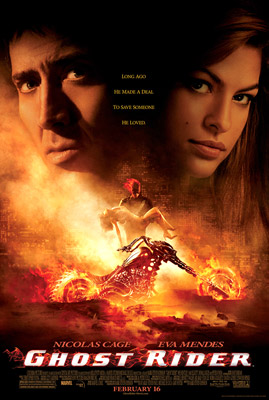
Ghost Rider
speaks to paradigm shift from print literature to fantasy-driven visual
imagery.
Week 4 (February 19th-23rd,
2007) The Principle of Unity in Writing
10.0 Monday, February 19th, 2007
10.1 Homework #8 Due – The Double Creating Technique (At start of class)
10.2 Lecture/Discussion: “The Principle of Unity in Writing”
10.3
11.0 Wednesday, February 21st, 2007
11.1 Lecture/Discussion: “The Principle of Unity in Writing: The Levels of Support”
11.2
11.3 Homework #9: James Baldwin, “My Dungeon Shook,” pgs. 67-70, Writing for Insight, pg. 70 from The Effective Writer.
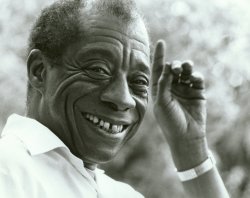
12.0 Friday, February 23rd, 2007
12.1 Homework #9 Due (Via email as of 10:00am)
12.2 Lecture/Discussion: “The Principle of Coherence in Writing: From Key Terms to Synonym Reference”
12.3
Week 5 (February 26th-March
2nd, 2007) The Principle of Coherence in Writing
13.0 Monday, February 26th, 2007
13.1 Lecture/Discussion: "The Principle of Coherence in Writing: Synonym Reference"
13.2 Homework #10: Susan Taylor, “Coming to Faith,” from The Effective Writer, Writing for Insight, pgs. 63-67.

14.0 Wednesday, February 28th, 2007
14.1 Homework #10 Due (Via email as of 10:00am)
14.2 Special Black History Month Guest Lecture: "Fom the Ashes of Frustration: Reflections on the Black Panther Party and Its Legacy to the Youth of Urban America" (Special Guest Lecturer: Mr. Bobby Seale, former Chairman, Black Panther Party for Self-Defense)
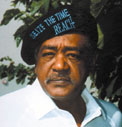
14.3 Closing of Write Time #1 (As of 4:00pm)
15.0 Friday, March 2nd, 2007
15.1 Lecture/Discussion: "Writing the Personal Experience Narrative"
15.2 Writing Assignment #1: To do Double Creating Technique of Looping and Cubing on assigned subject(s), then 750-1,000 word Personal Experience Narrative on Selected Topic.
Week 6 (March 5th-9th,
2007) Critical Thinking and the
Evaluative Essay
16.0 Monday, March 5th, 2007
16.1 Objective Quiz No. 1 (45 minutes)
16.2
16.3 Homework #11 – Writing Task – Writing About Written Works, pg. 292 with Assigned essay “If I Were A Black Man” by Cynthia Heimel, pgs. 326-328 from One to One.
17.0 Wednesday, March 7th, 2007
17.1 Lecture/Discussion: "Considerations in Writing Evaluative Essays" (Posted on Internet)
17.2
17.3 Write Time Discussion Forum #2: "On the Importance of Reading: The Reflective Writer" – This Write Time opens as of 4:00pm and will remain open until Saturday, March 31st, 4:00pm. Students have from March 7th – March 15th in which to make first posting to the Write Time Writing Prompt with the deadline for that posting being 10:00pm on March 15th.)
18.0 Friday, March 9th, 2007
18.1 Presentation/Discussion: "The Information Age and Pan African Studies: Reflections on Getting Up to Speed When You're Been Accustomed to Traveling in a Horse-Drawn Carriage"
18.1 Presentation/Discussion: "Further Considerations When Writing the Evaluative Essay: The Importance of Dotting the I's and Crossing the T's with Formal Expository Writing" (ppt.)
18.2 Writing Assignment #2: To do Double Creating Technique of Looping and Cubing + 750-1,000 word Evaluative Essay on Hotel Rwanda (Note – Students to rent film from preferred video outlet, e.g., Blockbuster, Hollywood Video, et al)
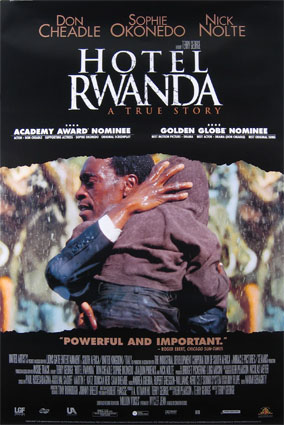
Hotel
Week 7 (March 12th-16th,
2007) Tone, Point of View and Coherence in Writing
19.0 Monday, March 12th, 2007
19.1 Homework #11 Due (Via email as of 10:00am)
19.2 Writing Assignment #1 Due (At start of class with Double Creating Technique attached)
19.3 Review Results: "Objective Quiz #1"
19.4
20.0 Wednesday, March 14th, 2007
20.1 AW Group Presentation #1 – Group 1, "Point of View," pgs. 443-451 (Each group has 20 minutes in which to present with all presentations based upon Appendices - One to One)
20.2 AW Group Presentation #1 – Group 2, "Tone," pgs. 452-458 (Each group has 20 minutes in which to present with all presentations based upon Appendices - One to One)
20.3
20.4 Homework #12 – The Power Vocabulary (Students are to define the concepts and then write a sentence correctly using the concept. Lastly, students are to find/identify an antonym for the original power word)
21.0 Friday, March 16th, 2007
21.1 Homework #12 Due (Via email as of 10:00am)
21.2 Return of WA#1 for Rewrites and Revisions (To be done at LRC with Writing Specialists)
21.3 Writing Assignment #2 Due (At the start of class with creating techniques attached)
21.4 AW Group Presentation #1 – Group 3, "Coherence," pgs. 459-467; Group 4, "Introductions and Conclusion," pgs. 468-477 (Each group has 20 minutes in which to present with all presentations based upon Appendices - One to One)
21.5 Advanced Writing Group Presentation Assignments – 2nd Round, MLA Guidelines (Note: All presentations based upon What Every Student Should Know About…)
21.6
Week 8 (March 19th-23rd,
2007) Midterm
Examinations
22.0 Monday, March 19th, 2007
22.1 Discussion/Presentation: "Organizing Your Argument" (ppt.)
23.0 Wednesday, March 21st, 2007
23.1 Writing Assignment #1 Rewrites and Revisions Due (At start of class with original drafts attached and copy of LRC Writing Specialist's Receipt – No "Bonuses awarded without the receipt!)
23.2 Return of WA#2 for Rewrites and Revisions (Revising to
be done at
23.3 Lecture/Discussion: "The Function Paragraph and Most Common Usages of the Comma"
23.4 Peer Critiques of Selected WA#1 Personal Narrative Essay
23.5
24.0 Friday, March 23rd, 2007
24.1 Midterm Common Essay Examination (Large Blue Book Required)
24.2
Week 9 (March 26th-30th,
2007) Midterm Examinations
25.0 Monday, March 26th, 2007
25.1 Writing Assignment #2 Revision Due (At start of class with original draft attached and signature from LRC Writing Specialist)
25.2 Midterm Objective Examination – Part 1: Vocabulary (45 minutes)
25.3 Homework #13: Emma Jackson, “The N Word,” pgs. 96-101, Writing for Insight from The Effective Writer.
26.0 Wednesday, March 28th, 2007
26.1 Homework #13 Due (Via email as of 10:00am)
26.2 Writing Assignment #2 Rewrites and Revisions Due (At start of class with original drafts attached and copy of LRC Writing Specialist's Receipt – No "Bonuses awarded without the receipt!)
26.2 Midterm Objective Examination – Part 2: Writing Conventions (45 minutes)
27.0 Friday, March 30th, 2007
27.1 Official State and School Holiday -- Caesar Chavez Day (Campus is Closed)
27.2 Closing of Write Time #2 (As of 7:00pm)
27.3 Write Time Discussion Forum #3 – "Bill Cosby's 'Pound Cake' Speech: Was TV's Dr. Huxtable Right or Wrong in Going Public?" (Opens as of 3:30pm Tuesday, April 3rd and closes as of 9:00pm Tuesday, May 1st. Students have up through 9:00pm of Sunday, April 15th, to answer the original writing prompt for this Write Time. Everyone is required to read Cosby's "Pound Cake" speech before commenting.)
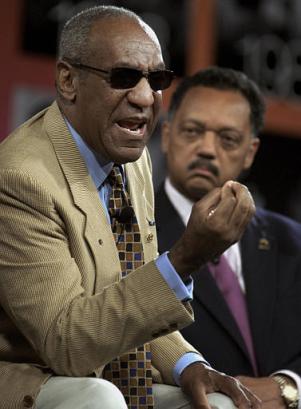
Noted comedian and philanthropist Bill Cosby moved a
far distance from television persona
Dr. Clifton Huxtable in criticisms
directed at Black lower class in "Pound Cake" speech delivered
on the 50th Anniversary of U.S. Supreme Court's Brown v. Board of Education decision.
Note
– Spring Break is April 2nd-8th, No Classes and Campus is
Closed.
Week 10 (April 9th-13th,
2007)
28.0 Monday, April 9th, 2007
28.1 Midterm Examination Status Report: Midterm Essay Exam, Midterm Objective Exam, WA Average, Write Time Average, Homework Average and Class Rankings
28.2 Peer Critiques and Selected
28.3 Return of Midterm Common Essay Examinations for Rewrites and Revisions
28.4 Homework #14: Gwen Pough, “Confronting and Changing Images and Representations of Black Womanhood in Rap Music,” from The Effective Writer, Writing for Insight, pgs. 101-105.

29.0 Wednesday, April 11th, 2007
29.1 Homework #14 Due (Via email as of 10:00am)
29.2 Lecture/Discussion: “The Six Usages of the Function Paragraph - Part 1”
29.3 Homework #15: Jewell Gomez, “Black Lesbians, “Passing, Stereotypes and Transformations,” from The Effective Writer, Writing for Insight, pgs. 105-111.
30.0 Friday, April 13th, 2007
30.1 Homework #15 Due (Via email as of 10:00am)
30.2 Lecture/Discussion: "The Six Usages of the Function Paragraph - Part 2"
30.3
Week 11 (April 16th-20th,
2007) The
Process of Logical Argumentation

Cars shown here are submerged in New
Orleans’ 9th Ward in aftermath of Hurricane Katrina
and the Great
Flood once the levees broke.
31.0 Monday, April 16th, 2007
31.1 Writing Assignment #3 Due: "An Open Letter to MSNBC President: The Don Imus Affair" (Via email as of 10:00am as a Microsoft Word attachment and as hard copy at start of class)
31.2 Midterm Essay Examination Revisions Due (By or before 4:30pm at PAS Main Office, Santa Susana Bldg. Room 221 or at start of class with original Blue Books. All revisions to be handwritten on separate paper from Blue Books, to include receipt from LRC Writing Specialist)
31.3 Lecture/Discussion: "Writing the Argumentative Essay: Assertions and Evidence"
31.4 Homework #16: “Public Statement by Eight

Bicyclist on pier in
where many thought
only place afflicted was
32.0 Wednesday, April 18th, 2007
32.1 Homework #16 Due (Via email as of 10:00am)
32.2 Lecture/Discussion: "Writing the Argumentative Essay – From Examples to Process Analysis, Part 2"
32.3 Screening: Spike Lee's HBO documentary Where the Levees Broke (2006) (Note: Film is on reserve at the Oviatt Media Library – 2nd Floor, West Wing)
32.4 Writing Assignment #4 – To do Double Technique of Cubing and Track-Switching on When The Levees Broke + 1,500-word Argumentative Essay that looks at the crisis that enveloped residents of the Gulf Coast in aftermath of Hurricanes Katrina and Rita as well as the Great New Orleans Flood of 2005. Choose either Problem #12 or #13 from Writing Task – Argumentative Essay, pgs. 224-225 in focusing your argument.
32.3 Homework #17 -- "Letter from a Birmingham Jail" by Rev. Martin Luther King, Jr., pgs. 113-125, Writing for Insight from The Effective Writer
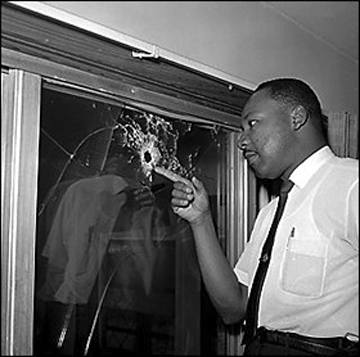
Many were the assassination attempts made on the life
of late Rev. Martin Luther King, Jr. with the Nobel Peace Prize leader shown
here pointing to bullet hole in closet, yet
another
failed attempt for the man who truly was the Drum Major for Justice.
33.0 Friday, April 20th, 2007
33.1 Homework #17 Due (Via email as of 10:00am)
32.2 Lecture/Discussion: "Writing the Argumentative Essay – From the Counter Argument to Effective Conclusions, Part 3"
33.3 Homework #18: Farai Chideya, “The Myth of the Welfare Queen,” from The Effective Writer, Writing for Insight, pgs. 155-159.
33.4
Week 12 (April 23rd-27th,
2007) The
Annotated Bibliography
34.0 Monday, April 23rd, 2007
34.1 Homework #18 Due (Via email as of 10:00am)
34.2 Homework #19: Johnie Scott, “The Fire This Time,” from The Effective Writer, Writing for Insight, pgs. 51-57.
34.3 Lecture/Discussion: "Writing the Argumentative Essay – From Developing Titles to Effective Thesis Statements"
34.4
35.0 Wednesday, April 25th, 2007
35.1 Homework #19 Due (Via email as of 10:00am)
35.2 Lecture/Discussion: "The Don Imus Affair and Letter Writing Campaigns"
35.3
35.4 Final Homework #20: Harry Edwards, “Crisis of Black Athletes on the Eve of the 21st Century,” from The Effective Writer, Writing for Insight, pgs. 159-165.
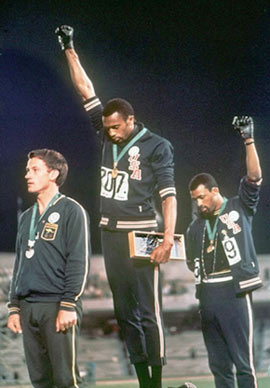
Tommie Smith (center) and John Carlos (right) showing the Black Power salute in the 1968 Summer Olympics while Silver medalist Peter Norman (left) wears an OPHR badge to show his support for the two Americans.
36.0 Friday, April 27th, 2007
36.1 Final Homework #20 Due (Via email as of 10:00am)
36.2 Writing Assignment #4 Due (At start of class with Double Creating Technique attached – No paper will be accepted without the techniques)
36.3 Lecture/Discussion: "Sentence Clarity in Writing - Part 1"
36.4
36.5 Recommended Viewing: The Last King of Scotland(2006) starring Forest Whittaker (PAS 350 students are highly recommended to
use the weekend in renting and viewing DVD of Academy Award-winning feature
film on deceased Ugandan dictator Idi Amin, played by Forest Whitaker, as background in
preparation for Capstone papers on Murambi,
The Book of Bones. Highly recommended that students do background research
on genocidal conflicts in
Week 13 (April 30th-May
4th, 2007) Guidelines for
the Case Study or Capstone Paper
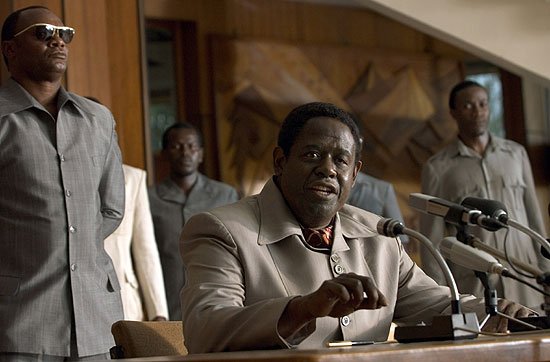
Forest Whitaker shown in his Academy Award-winning
"Best Actor" role as brutal Ugandan dictator Idi
Amin in The Last King of Scotland (2006).
After Sidney Poitier (Lilies of the
Field), Denzel Washington (Training Day) and Jamie Foxx(Ray), Whitaker’s role highlights horrific events
on African continent that have reached out to touch the
consciences of peoples worldwide where genocide is concerned.
37.0 Monday, April 30th, 2007
37.1 Lecture/Discussion: "Sentence Clarity in Writing - Part 2"
37.2 Lecture/Discussion: "Writing the Annotated Bibliography"
37.3 WA#5 Annotated Bibliography Assignments: AB #1 – Ella Fitzgerald, AB #2 – Ralph Ellison, AB#3 – Rita Dove, AB#4 – Spike Lee, and AB #5 – Jawanzaa Kunjufu
37.4
37.5 Closing of Write Time Discussion Forum #3 (As of 9:00pm, Tuesday, May 1st)
37.6 Final Write Time Discussion Forum #4: "What Will It Take for Pan African Studies to Gain Respect from All Sectors of the Community, On-Campus and in Da Hood?" Opens as of 9:00pm Tuesday, May 1st and closes as of 9:00pm Friday, May 18th.
38.0 Wednesday, May 2nd, 2007
38.1 The 13-Week Intermediate Essay
Examination (Large Blue Book Required)
38.2
39.0 Friday, May 4th, 2007
39.1 Special Library Workshop: "Information Sciences and the Annotated Bibliography" (Guest Lecturer; Ms. Lynn Lampert, Oviatt Library Sr. Research Librarian with Class Meeting at the Delmar T. Oviatt Library)
39.2
Week 14 (May 7th-11th,
2007) MLA Guidelines
"There are days when the result
is so bad that no fewer than five revisions are required. In contrast, when I'm
greatly inspired, only four revisions are needed."
— John
Kenneth Galbraith
40.0 Monday, May 7th, 2007
40.1 Peer Critiques: "Intermediate Essay Examination Results with Selected Readings" (Students to do Intermediate Essay Exam Revisions at University Learning Resource Center)
40.2
41.0 Wednesday, May 9th, 2007
41.1 AW Group Presentations Round No. 2, "MLA Format" – Group 1: Chapter 3, "The Works Cited List," pgs. 8-15 from What Every Student Should Know About…; Group 2: Chapter 3, "The Works Cited List," pgs. 16-25 from What Every Student Should Know About…(Each group has 25 minutes in which to make presentation which is to include PowerPoint and handout – everyone is expected to bring their book)
42.0 Friday, May 11th, 2007
42.1 Final Writing Assignment #5 Due -- "The Annotated Bibliography" (By or before 4:00pm in PAS Main Office -- No "Late" Papers will be accepted!)
42.2 Peer Critique/Discussion -- "Write Time #3 and the Electronic Dialogue" (To include selected readings of Write Time postings by students)
Week 15 (May 14th-18th,
2007)
43.0 Monday, May 14th, 2007
43.1 Intermediate Essay Exam Revision Due (By or before 4:00pm in PAS Main Office -- Any student who has not met with an LRC Writing Specialist must still return Blue Book by that time: "No exceptionbs!")
43.2 AW Group Presentations Round No. 2, "MLA Format" – Group 3: Chapter 3, "The Works Cited List," pgs. 25-33 from What Every Student Should Know About…; Chapter 5, "Citing Works in the Body of Your Paper," pgs. 36-43 from What Every Student Should Know About…(Each group has 10-15 minutes in which to make presentation which is to include PowerPoint and handout – everyone is expected to bring their book)
43.3 Students signup for Individual Faculty-Student Clinical Conferences with Instructor (Note – 15 minutes per student in Instructor’s Office)
44.0 Wednesday, May 16th, 2007
44.1 PAS 350 Common Essay Examination (Large Blue Book Required)
44.2 Capstone Paper Thesis Statements Due Via Email
as of 9:00pm (Includes Proposed Working Title, Thesis Statement and Two Sources to be used for paper)
45.0 Friday, May 18th, 2007
45.1 AW Group Presentations Round No. 2, "MLA Format" – Group 5: Chapter 6, "Preparing and Formatting Your Paper," pgs. 44-50 from What Every Student Should Know About…(This group has 10 minutes in which to make presentation which is to include PowerPoint and handout – everyone is expected to bring their book)
45.2 Lecture/Discussion: "Murambi -- The Book of Bones: Critical Considerations in Writing a Capstone Paper"
45.3 Closing of Final Write Time Discussion Forum #4 (As of 9:00pm)
Week 16 (May 21st-25th,
2007) Final Examinations
46.0 Monday, May 21st, 2007
46.1 Final Examination
Day - Time of class is 10:15am-12:15pm
46.2 Exit Essay Examination (Large Blue Book Required)
46.3 Return of PAS 350 Student Portfolioes (i.e., Exams, Writing Assignments, etcetera)
47.0 Friday, May 25th, 2007
47.1 PAS 350 Capstone Paper Due (As of 3:00pm in the Pan African Studies Main Office, Santa Susana Building Room 350 – No papers will be accepted after that time.)